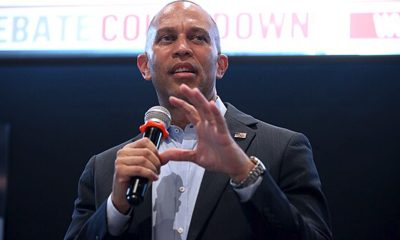Op-Ed
Will the Crucifixion in Charleston Lead to a Resurrection?
By Rev. Jesse L. Jackson, Sr.
NNPA Columnist
The confederate flag finally came down in Charleston, S.C. The flag celebrated the sedition, slavery and succession of the Civil War. When Robert E. Lee surrendered, that flag was taken down. It was raised again over the statehouse in 1961 to celebrate segregation, suppression and states rights. Previous efforts to remove it failed. Former Gov. David Beasley called for it to come down, and probably lost his re-election as a result. Even after the triumph of the Civil Rights Movement, South Carolina burnished this symbol of racial division.
This symbolic victory came in the wake of bloodshed: the murders of the Emanuel Nine, brutally slain while in church at Bible study. It came because of the amazing grace of the relatives of the slain, offering forgiveness to the hateful killer who killed the nine in cold blood. It came because of the leadership and courage of the Gov. Nikki Haley, who stood up and spoke out in the wake of the horror, calling for legislature to take the flag down. It came because of the pressure of the Chamber of Commerce and business leaders – from Boeing, Volkswagen and others – making it clear that they would find it difficult to invest in a South Carolina still intent on honoring this symbol of racial division.
The question now is whether South Carolina can discard not just the symbol of the flag, but also the substance of the flag’s agenda. Can the governor now grasp this moment to lead in resurrecting the South?
Bringing down the flag has opened the way. The NCAA lifted its ban on post-season championship events in South Carolina, a decision that could produce millions in tourist revenues. New investments are likely to go forward now that the flag is down. Last month, Gov. Haley signed into law a bill requiring police to wear body cameras, putting the state in the national leadership on that issue. But much more needs to be done.
South Carolina is one of the states that chose to reject the expansion of Medicaid offered by health care reform, even though the federal government would initially pick up virtually all of the expense. It turned its back on $12 billion over the next five years, money that its hospitals and health system desperately needs. It deprived more than 160,000 of its working people, more Whites than Blacks, from getting health insurance. Surely this is the time to reverse that decision.
South Carolina has joined other Southern states in erecting voter ID laws designed to make voting more difficult, with disproportionate impact on the elderly, people of color and the poor. This, too, was discriminatory in effect and in intent. The more extreme North Carolina law is now being challenged in the Supreme Court. South Carolina could lead the South in reforming its laws to ease registration and voting rather than restricting it.
South Carolina’s representatives tend to support the assault on public investment favored by national Republicans. The U.S. Army Corps of Engineers has just announced that it plans to go forward with deepening the ports at Charleston and Jasper; South Carolina will benefit greatly once the port is able to handle the larger modern container ships. As the state benefits from federal investment in its ports, surely it is time for its representatives to push for greater public investment in infrastructure, and not continue to starve it.
Gov. Haley could be the determining force. She has focused on jobs, driving an agenda designed to make South Carolina attractive to business. She has demonstrated leadership in regard to the flag. She’s announced her commitment to save South Carolina State University, the state’s only public historically Black college.
She has earned the good will of the vast majority of South Carolina citizens and businesses. Now she can turn that authority to making South Carolina a leader of the New South.
Jesse L. Jackson, Sr. is founder and president of the Chicago-based Rainbow PUSH Coalition. You can keep up with his work at www.rainbowpush.org.
###
Advice
COMMENTARY: If You Don’t Want Your ‘Black Card’ Revoked, Watch What You Bring to Holiday Dinners
From Thanksgiving to Christmas to New Year’s Day, whether it’s the dining room table or the bid whist (Spades? Uno, anyone?) table, your card may be in danger.

By Wanda Ravernell
Post Staff
From the fourth week of November to the first week in January, if you are of African descent, but particularly African American, certain violations of cultural etiquette will get your ‘Black card’ revoked.
From Thanksgiving to Christmas to New Year’s Day, whether it’s the dining room table or the bid whist (Spades? Uno, anyone?) table, your card may be in danger.
It could take until Super Bowl Sunday for reinstatement.
I don’t know much about the card table, but for years I was on probation by the ‘Aunties,’ the givers and takers of Black cards.
How I Got into Trouble
It was 1970-something and I was influenced by the health food movement that emerged from the hippie era. A vegetarian (which was then considered sacrilegious by most Black people I knew) prepared me a simple meal: grated cheese over steamed broccoli, lentils, and brown rice.
I introduced the broccoli dish at the Friday night supper with my aunt and grandfather. She pronounced the bright green broccoli undone, but she ate it. (I did not, of course, try brown rice on them.)
I knew that I would be allowed back in the kitchen when she attempted the dish, but the broccoli had been cooked to death. (Y’all remember when ALL vegetables, not just greens, were cooked to mush?)
My Black card, which had been revoked was then reattained because they ate what I prepared and imitated it.
Over the decades, various transgressions have become normalized. I remember when having a smoked turkey neck instead of a ham hock in collard greens was greeted with mumblings and murmurings at both the dining room and card tables. Then came vegan versions with just olive oil (What? No Crisco? No bacon, at least?) and garlic. And now my husband stir fries his collards in a wok.
But No Matter How Things Have Changed…
At holiday meals, there are assigned tasks. Uncle Jack chopped raw onions when needed. Uncle Buddy made the fruit salad for Easter. My mother brought the greens in winter, macaroni salad in summer. Aunt Deanie did the macaroni and cheese, and the great aunts, my deceased grandmother’s sisters, oversaw the preparation of the roast beef, turkey, and ham. My father, if he were present, did the carving.
These designations/assignments were binding agreements that could stand up in a court of law. Do not violate the law of assignments by bringing some other version of a tried-and-true dish, even if you call it a new ‘cheese and noodle item’ to ‘try out.’ The auntie lawgivers know what you are trying to do. It’s called a menu coup d’état, and they are not having it.
The time for experiments is in your own home: your spouse and kids are the Guinea pigs.
My mother’s variation of a classic that I detested from that Sunday to the present was adding crushed pineapple to mashed sweet potatoes. A relative stops by, tries it, and then it can be introduced as an add-on to the standard holiday menu.
My Aunt Vivian’s concoctions from Good Housekeeping or Ladies’ Home Journal magazine also made it to the Black people’s tables all over the country in the form of a green bean casserole.
What Not to Do and How Did It Cross Your Mind?
People are, of all things holy, preparing mac ‘n’ cheese with so much sugar it tastes like custard with noodles in it.
Also showing up in the wrong places: raisins. Raisins have been reported in the stuffing (makes no sense unless it’s in a ‘sweet meats’ dish), in a pan of corn bread, and – heresy in the Black kitchen – the MAC ‘n’ CHEESE.
These are not mere allegations: There is photographic evidence of these Black card violations, but I don’t want to defame witnesses who remained present at the scene of the crimes.
The cook – bless his/her heart – was probably well-meaning, if ignorant. Maybe they got the idea from a social media influencer, much like Aunt Viv got recipes from magazines.
Thankfully, a long-winded blessing of the food at the table can give the wary attendee time to locate the oddity’s place on the table and plan accordingly.
But who knows? Innovation always prevails, for, as the old folks say, ‘waste makes want.’ What if the leftovers were cut up, dipped in breadcrumbs and deep fried? The next day, that dish might make it to the TV tray by the card table.
An older cousin – on her way to being an Auntie – in her bonnet, leggings, T-shirt, and bunny slippers and too tired to object, might try it and like it….
And if she ‘rubs your head’ after eating it, the new dish might be a winner and (Whew!) everybody, thanks God, keeps their Black cards.
Until the next time.
Alameda County
Seth Curry Makes Impressive Debut with the Golden State Warriors
Seth looked comfortable in his new uniform, seamlessly fitting into the Warriors’ offensive and defensive system. He finished the night with an impressive 14 points, becoming one of the team’s top scorers for the game. Seth’s points came in a variety of ways – floaters, spot-up three-pointers, mid-range jumpers, and a handful of aggressive drives that kept the Oklahoma City Thunder defense on its heels.

By Y’Anad Burrell
Tuesday night was anything but ordinary for fans in San Francisco as Seth Curry made his highly anticipated debut as a new member of the Golden State Warriors. Seth didn’t disappoint, delivering a performance that not only showcased his scoring ability but also demonstrated his added value to the team.
At 35, the 12-year NBA veteran on Monday signed a contract to play with the Warriors for the rest of the season.
Seth looked comfortable in his new uniform, seamlessly fitting into the Warriors’ offensive and defensive system. He finished the night with an impressive 14 points, becoming one of the team’s top scorers for the game. Seth’s points came in a variety of ways – floaters, spot-up three-pointers, mid-range jumpers, and a handful of aggressive drives that kept the Oklahoma City Thunder defense on its heels.
One of the most memorable moments of the evening came before Seth even scored his first points. As he checked into the game, the Chase Center erupted into applause, with fans rising to their feet to give the newest Warrior a standing ovation.
The crowd’s reaction was a testament not only to Seth’s reputation as a sharpshooter but also to the excitement he brings to the Warriors. It was clear that fans quickly embraced Seth as one of their own, eager to see what he could bring to the team’s championship aspirations.
Warriors’ superstar Steph Curry – Seth’s brother – did not play due to an injury. One could only imagine what it would be like if the Curry brothers were on the court together. Magic in the making.
Seth’s debut proved to be a turning point for the Warriors. Not only did he contribute on the scoreboard, but he also brought a sense of confidence and composure to the floor.
While their loss last night, OKC 124 – GSW 112, Seth’s impact was a game-changer and there’s more yet to come. Beyond statistics, it was clear that Seth’s presence elevated the team’s performance, giving the Warriors a new force as they look to make a deep playoff run.
Activism
ESSAY: The Hidden Toll — Federal Rollbacks Threaten Black Women’s Health in California
Nutrition assistance programs, which many Black women rely on to keep their families healthy and out of the hospital, are similarly endangered. Nearly half of Black women in California receive WIC, and 47% percent use CalFresh. Cuts or cost-shifts in those programs would worsen food insecurity, especially during pregnancy and postpartum. Malnutrition or diet instability can lead to adverse birth outcomes, weakened immunity, and worse recovery from medical interventions.

By Kellie Todd Griffin, Special to California Black Media Partners
If recent proposals in Congress to cut funding for federal social programs succeed, the downstream effects will not be abstract or distant.
They will be immediate and blunt — and felt in every clinic, every hospital, and most homes where Black women are struggling to maintain our health, care for her children, and stay afloat. In California, where Black women already navigate a terrain of deep systemic inequities, these cuts would be catastrophic.
As a lifelong advocate for Black women in California — through my research and lived experience – I’ve seen firsthand the entrenched medical and social disparities that leave too many Black women struggling to live healthy, fulfilling lives.
Across the spectrum of care — from mental, maternal, and perinatal health to chronic diseases like diabetes, hypertension, cancer, and uterine fibroids — Black women in California continue to bear a disproportionate burden.
Implicit bias in maternity care, for example, continues to be a challenge. It is a documented contributor to the fact that, in California, Black women die from pregnancy-related causes at three to four times the rate of White women.
Now, federal proposals on the table to slash funding for the very programs Black women rely on most: Medicaid (Medi-Cal in California) SNAP/CalFresh, WIC, and federal housing and income supports. As reported in the California Budget and Policy Equity on the Line report, about one in three Black women and children in California currently depend on Medi-Cal. If federal cuts were to force reductions in eligibility, benefits, or provider reimbursements, many Black women would lose access to primary care, chronic disease management, reproductive care, mental health and substance-use treatment, cancer screenings, and prenatal/postnatal services.
In a state already grappling with stark racial health disparities, removing coverage is not just harmful — it magnifies injustice. Black women in California face higher rates of poor health overall, lower life expectancy, and worse prenatal care statistics. When the safety net frays, they will be forced into impossible trade-offs: skip medications, delay care, or incur medical debt.
Nutrition assistance programs, which many Black women rely on to keep their families healthy and out of the hospital, are similarly endangered. Nearly half of Black women in California receive WIC, and 47% percent use CalFresh. Cuts or cost-shifts in those programs would worsen food insecurity, especially during pregnancy and postpartum. Malnutrition or diet instability can lead to adverse birth outcomes, weakened immunity, and worse recovery from medical interventions.
Compounding the harm is the assault on social determinants of health. The Equity on the Line analysis shows that housing assistance, income support, and childcare subsidies are already stretched thin. Any rollback will accelerate housing instability, homelessness risk, and family stress — all of which manifest in worse health outcomes: higher hypertension, depression, chronic illness, and reduced ability to adhere to medical regimens.
California has taken important steps to protect Black women’s health. One good example is Assembly Bill, AB 2319, authored by Assemblymember Lori D. Wilson (D-Suisun City). That law strengthens the Dignity in Pregnancy and Childbirth Act by expanding and enforcing implicit bias training for providers in perinatal settings, and requiring reporting and penalties for noncompliance.
The state is also taking legal and policy action to mitigate the impact of cuts to SNAP/CalFresh food stamp benefits – like mobilizing $80 million in state funds to support food banks. It is also taking action to shore up against federal cuts to Medi-Cal.
In our communities, organizations like California Black Women’s Health Project and Black Women for Wellness are already doing the groundwork — advocating for culturally centered care, education, and infrastructure to mitigate harm.
As Californians, we must all roll up our sleeves and amplify and bolster their efforts. These organizations serve as our voice. They are our watchdogs, too, documenting where bias persists, where systems fail, and where state enforcement is weak.
The stakes are too high for complacency. As we strategize to keep Black women healthy, we must also document and share our stories with others — every death, every untreated illness, every delayed pregnancy.
Let us be resolute, organized, hopeful, and persistent. California can be a model of how a state defends Black women’s health amid significant challenges, presenting a full vision to America, and the world, of how we can make health justice a reality and make California healthier for all our communities.
About the Author
Kellie Todd Griffin, President and CEO of the California Black Women’s Collective Empowerment Institute. With a deep commitment to equity and justice, she champions initiatives that amplify the voices and influence of Black women across California. Known for her strategic insight and passion for community empowerment, Kellie is a driving force in fostering systemic change and collective progress.
-

 Alameda County4 weeks ago
Alameda County4 weeks agoSeth Curry Makes Impressive Debut with the Golden State Warriors
-

 Bay Area3 weeks ago
Bay Area3 weeks agoPost Salon to Discuss Proposal to Bring Costco to Oakland Community meeting to be held at City Hall, Thursday, Dec. 18
-

 #NNPA BlackPress4 weeks ago
#NNPA BlackPress4 weeks agoFBI Report Warns of Fear, Paralysis, And Political Turmoil Under Director Kash Patel
-

 Activism3 weeks ago
Activism3 weeks agoMayor Lee, City Leaders Announce $334 Million Bond Sale for Affordable Housing, Roads, Park Renovations, Libraries and Senior Centers
-

 Activism3 weeks ago
Activism3 weeks agoOakland Post: Week of December 10 – 16, 2025
-

 Arts and Culture3 weeks ago
Arts and Culture3 weeks agoFayeth Gardens Holds 3rd Annual Kwanzaa Celebration at Hayward City Hall on Dec. 28
-

 Activism3 weeks ago
Activism3 weeks agoOakland School Board Grapples with Potential $100 Million Shortfall Next Year
-

 Activism3 weeks ago
Activism3 weeks ago2025 in Review: Seven Questions for Black Women’s Think Tank Founder Kellie Todd Griffin



























































